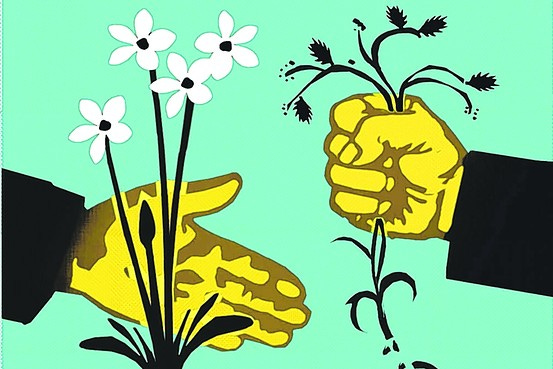Edition #67: Change vs. Transformation
Plus, happiness won't save you, a box of cookies for a cause, and cheap old houses
A Note From the Editor
For the lucky ones, life is long. For the luckiest, life is long and it is varied. The sentiment is encapsulated in the single phrase that transcends many different environments—tacked on the wall in a fourth-grade classroom, shared as a motivational fodder to defend a company reorg, gliding from the mouth of a friend in attempts to soften the blow of a heartbreak—change is the only constant. Our bodies show us this with all of their marvelous iterations: the peppy spring in a young person’s step, the rounded swell of a belly carrying budding life, the strand of chestnut hair sprouting silver instead. Nature, in her cyclical way, reminds us of the abiding state of change. The cooling of autumn air and the bone chill of a winter’s ocean. The melting of ice; breaking out slim strapped crop tops and open-toed shoes and licking cones of ice cream quick enough that its stickiness doesn’t drip between the cracks of our fingers.
Change is marked in these ways: time passing, seasons shifting, death and birth and trips and birthday parties. The mechanisms built into our social lives and our Google calendars, the persistent timeline-centric expectations that society and biology place on us to serve as mile markers for the passage of time. From my vantage point, no one pushes back against these rudimentary changes. They are accepted as a part of life. Embraced, though sometimes with a tinge of melancholy (things have really changed around here, you’ve changed). I often hear people speak about phases of life with a certain nose-up assuredness, particularly when one feels they are moving towards a more refined stage of adulthood (I don’t party like that anymore, I’ve grown up, he can't keep dating around that, he needs to grow up). Yet with all this broad acceptance for change, with the celebrations of its antiquated milestones being reached, there is still so much change that so many people will not accept. The change that feels threatening to their version of reality, that elicits a fearful response: what will this mean for me, for my future, or my children’s future?
It seems nonsensical to me that we could be so selective about what change is deemed “good” and what change isn’t, if only because we share a fundamental understanding that life is nothing but constant, never-ending change. Fifty years ago, in 1971, was the year the first microprocessor was invented by Intel. FedEx became a company and NPR put out its first-ever broadcast. The voting age in the US was legally lowered to 18. In Orlando, a theme park called Disney World opened. The world was entirely different because of course it was, as it will continue to be. So why, still, do we find come across such assiduous resistance to what is merely inevitable—to change?
I’ve been considering this and have only been able to reach one conclusion; the distinction between change and transformation. I don’t mean transformation in the broad sense of the word, but on an individual level. If change is the thing we all know to be a core tenant of life, marked by the passing of time, then change needn’t be active, but passive. I will know to take this next step because that is what people at this age do, I will know to stop wearing that type of clothing because people at my age wear the other type, and so forth. Moments of transition—from one phase of life to the next, from a cross-country move or newfound career path or the loss of a loved one—may present opportunities to transcend this passive change and experience moments of personal transformation, but they do not require it. It isn’t difficult to go through life having never transformed. Passivity is easier, it requires less effort.
Transformation takes courage. In some cases, it also takes work. I think about all the times in my life I showed up as the person I thought I needed to be in order to be accepted, with no real regard for the things I loved or cared about or wanted for myself. It’s part of the reason why it took me two years to admit to myself, and then aloud, that I wanted to be a writer. It may sound silly, but it was a terrifying transformation for me. In some ways, it still is. Suddenly I have to re-evaluate my values, I have to reassess what my life might look like with this wrench of instability throw in the mix. It’s the same reason it took me well into my 20’s to admit that I’ve liked girls before, that in middle school I really liked a girl and she liked me back. This didn’t need to be such a deep, dark secret but it was because its admittance felt like a transformation of my identity. I realize now that the transformation was never really about my career path or my sexual fluidity; those are merely inconsequential parts of a whole. It was about giving myself the grace to come to terms with the person I am. To show up as her, to give people a chance to know her and love her.
My heart is breaking for all those Trans children in Arkansas who have to muster up an insurmountable amount of courage to show up as who they are every single day, only to be told that who they are isn’t “normal” or “right.” I wish those lawmakers could allow themselves to be open to transformation, personally and idealistically. I wish we all could. We have the opportunity to transform the way we think and the way we love, to transform our understanding of people and subject matters that are entirely foreign to us, even the ones that scare us. Even the ones we do not yet understand. In 50 years, it will be 2071. People in Arkansas and all over the country will be baffled that this legislation was ever even on the table, the same way we are baffled that interracial marriage was illegal merely 55 years ago. You don’t have to agree with me, and you can be freaked out or afraid of that statement. But just like the melting ice and the greying hairs, collective transformation is also inevitable. It just takes a little more time.
Cheers, my dears, and as always, thanks for reading. I’d love to hear your take on change vs. transformation. Paricurualry, any major moments of transformation you’ve experienced and what spurred them.
Three Pieces of Content Worth Consuming
Happiness Won’t Save You. A stunning piece on Phillip Brickman, the psychologist who conducted the now-famous study comparing the levels of happiness of those who had won the lottery with those who had gotten in terrible accidents leaving them paralyzed. This profile / investigative piece begs the question: what sustains happiness? Is it what we should chase? And, are some destined to never meet happiness themselves, thanks to depressive predispositions?
“But what on earth do you live for, if not happiness? Your commitments, according to Brickman. They were the true road to salvation, he decided, the solution to an otherwise absurd existence.”
The Sweaty Startup. I'm not particularly drawn to business-type articles—they usually give me a burst and anxiety and make me go "should I be doing something else?” It's the particular brand of high achiever that triggers me. but the concept of the "sweaty startup" feels right. We had a family friend growing up who had a carpet cleaning business. In the middle of the night, he would have his guys go to Denny's to pressure wash the carpets. He contracted with Denny's franchises all over the country, and my brother (who was once of the pressure washers) recently mentioned that this family friend is a multi-millionaire. It checks out, as people seem to grow their wealth from the most random things—carpet cleaning and porter potty installation. Poo-Pourri! I can't tell if the idea of picking a non-desirable, “sweaty” startup is appealing because it feels like a shortcut or because it feels like a version of punishment. Either way, I'm interested.
Why Is Your Writing So Violent? I have yet to read a book by Joyce Carol Oates (aspiring writers should not admit this), but I especially want to after reading this piece. Like so many facets of life, Oates, an esteemed writer, has to deal with one persistent question over and over, merely because she is a woman: why is your writing so violent? A thoughtful reflection of what’s really being asked, and why it is being asked to her.
“What are we to make of the stubborn bitter truth that one's legitimacy is judged by whether one appears to be ''happy'' or ''unhappy''; that one's work is somehow assessed in terms of the spiritual uplift it offers?”
Perhaps You Should…
Buy Some Cookies for a Good Cause
This is my fantasy come true. If you live in NYC, consider partaking in The Cookie Edit, a project to support the rebuilding of local NYC restaurants. For $50, you get a box of the best cookies in the city (except they forgot Levain, but whatever) and a custom illustration. How cool is this? Preorder until 4/12.
**Bonus Content** (Cheap Old Houses)
The formula for Cheap Old Houses being the best account on Instagram right now goes like this: one part homeownership becoming so insanely competitive that people are buying half a million-dollar homes in all-cash on the regular, one part working remote, one part seriously considering whether communal living is actually the best idea.
A Quote From A Book You Should Read:
“She believed that one ought to have a singular major failure, in which all of one’s hopes were dashed, in order to sprout a life into something interesting, as pruned trees grow baroque and beautiful, because an unpruned tree only grows vertically and predictably, selfishly sucking up as much sunlight as possible”
-Detransition, Baby by Torrey Peters
This newsletter is best served with a side of conversation, so drop your opinions, reflections, and thoughts in the comments below and let’s get to talking.
Or, share the most thought-provoking piece from today’s edition with someone you love, then call them up to discuss, debate, and percolate. As a wise woman once said, “Great minds discuss ideas.”




